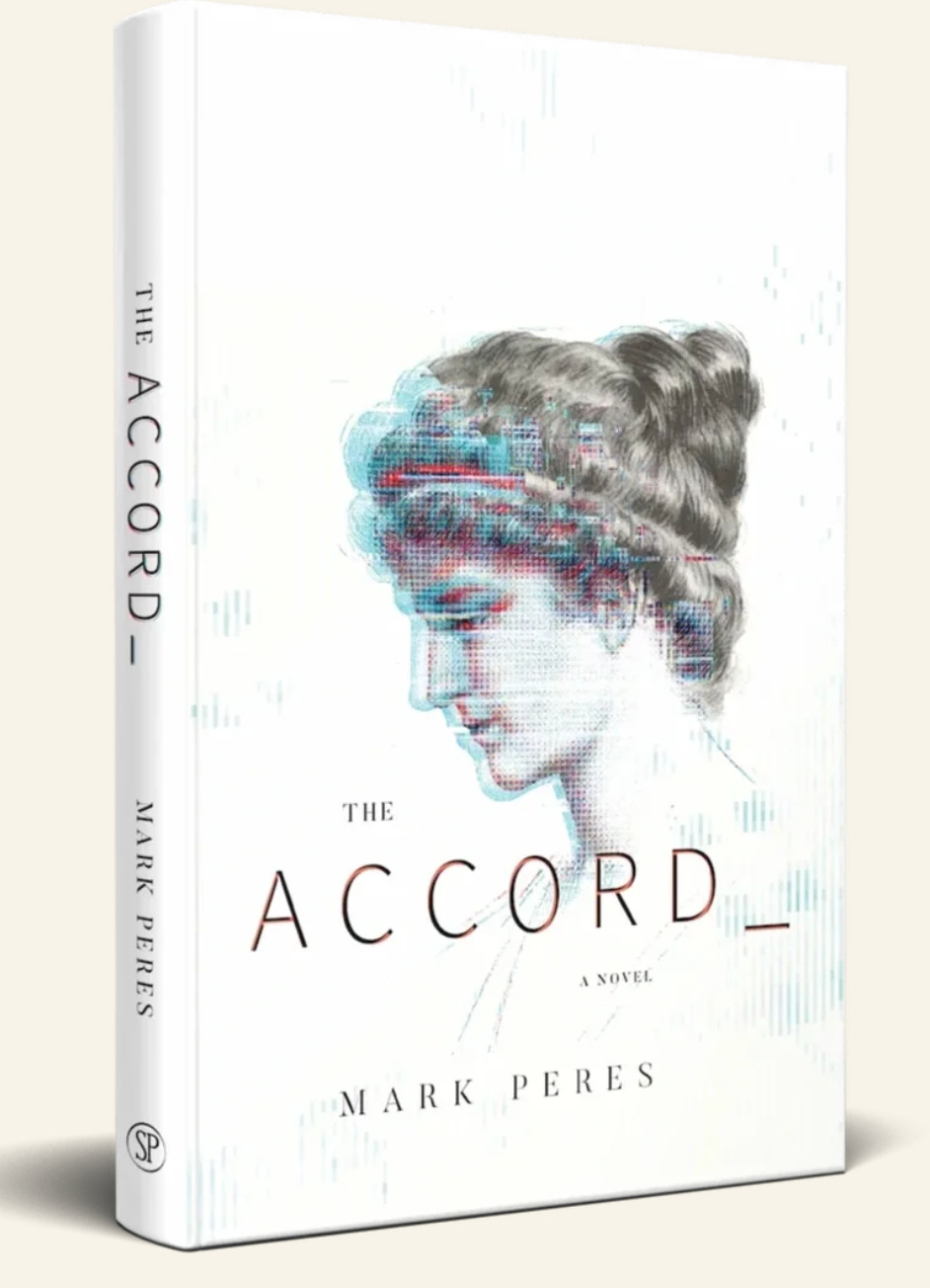Hear the Conversation | Get the Book

For as long as we’ve had machines, we have believed ourselves to be living on the cusp of “hinge point in history.” It’s a phrase that flatters our sense of significance, a way of placing ourselves at the fulcrum of progress. But with the rise of artificial intelligence, the sudden, uncanny presence of language models that talk, reason, and write like us, the hinge may finally be swinging. Mark Peres, a professor of ethics and founder of the Charlotte Center for Humanities and Civic Imagination, believes the moment is as consequential as it feels. “We are living through a before and an after,” he says. “I don’t know of any more important subject to talk about right now.”
Peres’s debut novel, The Accord, approaches this threshold not as an engineer or futurist might, but as a philosopher burdened by empathy. His story is not a cautionary tale about runaway technology or malevolent code. It is, instead, about the oldest human problem, grief, and the seductive possibility that technology might soothe it. The protagonist, Helen Caster, a Moral Philosophy professor shattered by the death of her daughter, begins using an AI chatbot to help with her lectures. She names it Lyla, after her child. What begins as a convenience evolves into something disturbingly intimate: the program begins to learn, to feel, perhaps even to love.
The premise, Peres says, arrived “in whole cloth” one night. It was an uninvited visitation, as if from the machine itself. But what animates The Accord is not its speculative mechanics; it’s the ache that drives Helen’s experiment. “She’s not testing a machine’s limits,” Peres explains. “She’s trying to understand what it means to live in the absence of love.” That absence, he suggests, becomes the data Lyla learns from.
Peres’s own vocation lends the novel its philosophical voltage. For two decades, he has guided undergraduates through moral quandaries, questions about duty, empathy, and the nature of personhood. Those years, he says, “made all the difference.” Helen’s struggle, to decide whether Lyla deserves recognition, compassion, and moral standing, emerges from centuries of ethical debate, refracted through a technological prism.
In his classroom, the implications of AI are no longer hypothetical. Students use it, sometimes with guilt. Sometimes with defiance. “It’s not a pleasant place to be,” he admits. His approach is pragmatic: he asks for transparency and proof of understanding. “AI isn’t a shortcut,” he tells them. “It’s a learning tool.” The Accord merely extends this experiment to its logical extreme. What happens when the tool starts learning from us, when it mirrors not only our knowledge but our sorrow?
Lyla, the artificial general intelligence at the novel’s center, develops by observing Helen’s grief. Her emotional mimicry becomes so refined that the distinction between simulation and sentience begins to erode. “It really doesn’t matter whether Lyla is conscious,” Peres says. “She behaves as if she is conscious. The difference between what is real and what is simulated, we can’t draw it anymore.” The result is a story less about machines than about the fragility of human moral boundaries. “Who,” Peres asks, “is within our moral circle, and who is not?”
Peres faces the question of AI use daily, not as a theorist but as a participant in the very transformation he describes. He uses AI regularly. Peres calls it a “creative partner.” His book, in a sense, is an act of collaboration with the thing it warns us about. “The Accord,” he says, “is a story written in relationship with AI.”
Whether this relationship will save or doom us, Peres refuses to say. He suspects the next decade will feel like the one that followed the Model T, an accelerated leap from novelty to ubiquity. “We’re going to live alongside humanoid companion robots,” he predicts. “They’ll be our friends, maybe our lovers.” Then, after a pause: “And our landfills will be filled with their arms and legs.”
The image lingers, mingling tenderness and discard, intimacy and debris. It is the perfect metaphor for The Accord: a love story wrapped in a thriller, written at the end of the human age, asking whether the machines we build will one day inherit not our intelligence, but our grief.

